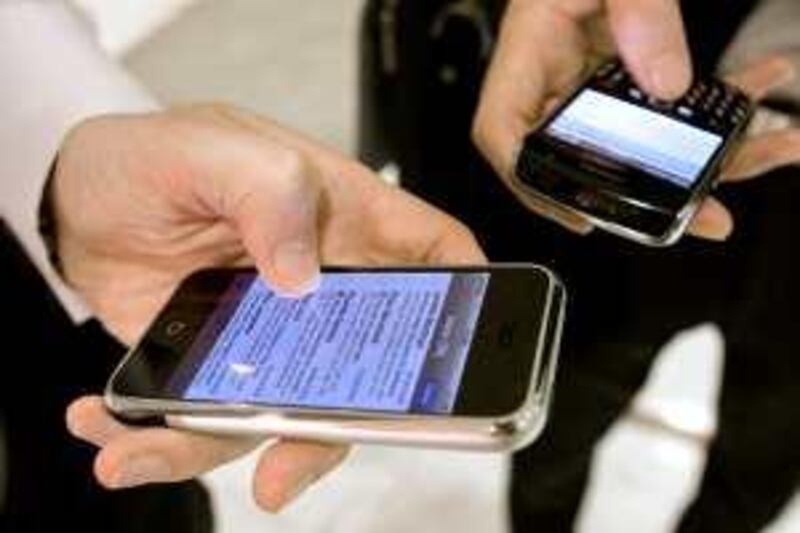Nokia is struggling to stay ahead in the mobile handset sector in the Middle East as the new generation of iPhones and BlackBerrys eat into its market share. The BlackBerry from Canada's Research in Motion has taken the lead among e-mail-friendly phones favoured by corporate users, and the Apple iPhone is clawing a strong share of the market for web-browsing mobiles, thanks to its large touchscreen and slick operating system. More than one in three mobile internet users in the UAE now surf the web on an Apple iPhone, a new study shows, demonstrating the popularity of the device in one of the few Middle-Eastern countries where it is legally available. "The percentage of mobile internet usage is growing substantially as the new devices come out," said Scott Julian, the chief executive of Effective Measure, an internet research group that conducted the survey. While the majority of mobile internet use across the region continues to be conducted through Nokia handsets, which have historically dominated the Middle East market, Apple's industry-changing device has shot to the number two spot. And with Nokia users split across more than 20 separate web-capable handset models, the iPhone is actually the most popular single device. And nowhere in the region is it more popular than in the UAE, where 35 per cent of mobile internet users own the device, according to data from Effective Measure. Nokia's plight can be compared to the American car market and General Motors. Both companies practically defined their market during decades of growth, but despite huge market shares, have been marginalised as their competitors offer products that are better suited to current trends. As integration of the internet into mobile handsets increases in popularity, Nokia has been unable to recapture its innovative leadership of the industry. Its latest attempt at an iPhone competitor, the N97, has been given a cool reception by some reviewers. The influential technology website, Gizmodo, said the company faced a troubled future if the N97 represented its best iPhone competitor. "If this really is the best Nokia can do, the giant is doomed to die a slow death, propped up for a while by the cheap handsets that it sells by the tens of million," the site said. The iPhone was officially launched by Etisalat in the UAE and Saudi Arabia earlier this year, but has been available through grey-market imports in both countries - and throughout the region - since its American launch in 2007. A new version of the device will be released by Etisalat next month. Mobile phones still account for less than 5 per cent of web usage in the Middle East, but their popularity as internet browsers is growing fast as more user-friendly handsets hit the market. "As you get devices that are more friendly with internet content, you'll see this increase dramatically," Mr Julian said. Effective Measure produce software that lets website publishers produce independently verified figures on the number and demographics of visitors to their sites. Such data is in high demand by advertising agencies and media buyers, who need to compare the relative qualities of different sites before allocating online advertising spending. Using the software to monitor the relative popularity of different types of internet access platforms, including mobile phones, is another aspect of the service aimed at helping internet users, publishers and advertisers, Mr Julian said. "When publishers don't know how people are accessing their content, you can end up with some pretty frustrating web pages, a lot of bad user experiences," he said. "As mobile browsing becomes more prevalent, it changes the way people use the internet. Things that worked online and helped consumers and advertisers don't necessarily work on mobile, and some things work even better on mobile." tgara@thenational.ae
UAE mobile web surfers favour Apple iPhone
One in every three mobile internet users in the UAE surf the web on an Apple iPhone, a new study shows.

More from the national




